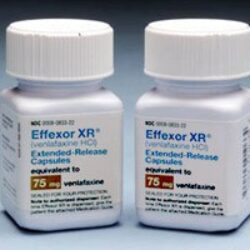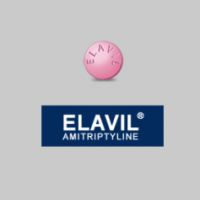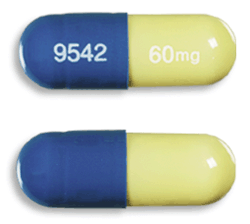Description
Drug Uses
Effexor is a potent inhibitor of the reuptake of serotonin and norepinephrine two neurotransmitters play important roles in the pathophysiology of depression. Symptoms of depression are relieved be correction the imbalance of these two chemicals.
How Taken
Effexor comes as a capsule to take orally. The general dosage is 2–3 times daily. Effexor should be taken with a meal. Do not divide, crush, chew, or place in water. Swallow each capsule with fluid or you can carefully open the capsule, sprinkle the contents on a spoonful of applesauce. And swallow this mixture without chewing. Have a glass of water straight after that.
Warnings/Precautions
If you are taking any medicines (including over the counter drugs and herbal supplements), you should let your doctor know about it before starting Effexor therapy. If you are taking MAOIs, you should not take Effexor. People taking antidepressants should be monitored closely, especially when they first start therapy or when their dose is changed. Patients may become suicidal, agitated, irritable, hostile, impulsive, or restless. If the patient is experiencing any of these conditions, it should be reported to the patient`s doctor immediately. Effexor may also raise blood pressure in some patients, monitor your blood pressure regularly. Talk to your doctor before stopping or reducing your dose of Effexor. Do not take Effexor, without consulting your doctor if you are pregnant, likely to become pregnant or breast feeding. It is better to avoid driving until you see how Effexor affects you. Avoid drinking alcohol while taking Effexor.
Missed Dose
If you miss a dose take it as soon as you remember. However, if it is almost time for the next dose, skip the Missed Dose and continue your regular dosing schedule. Do not take a double dose to make up for a missed one.
Possible Side Effects
Some of the Possible Side Effects of Effexor are– an allergic reaction (difficulty breathing, closing of the throat, swelling of the lips, tongue, or face, or hives), seizures, irregular heartbeat, severely high blood pressure (blurred vision, headache). If you experience any of these serious conditions, stop taking Effexor and seek medical attention immediately. Less serious side effects are more common these include– nausea, vomiting, upset stomach, abdominal pain, loss of appetite or weight, dry mouth, drowsiness or dizziness, mild tremor, anxiety, agitation, insomnia, abnormal dreams, sexual problems such as impotence, abnormal ejaculation, difficulty reaching orgasm, or decreased libido, sweating, yawning, or increase in blood cholesterol levels (detected by blood tests). Other side effects may also occur. Consult your doctor if you experience any of these or other side effects.
Storage
Store at room temperature 20–25°C (68–77°F), Keep away from children and excess heat and moisture (not in the bathroom).
Overdose
If overdose is suspected seek medical attention immediately. Some of the symptoms of Effexor overdose are– dizziness, drowsiness, numbness, nausea, irregular heartbeats, seizures, and unconsciousness.
More Information
Be careful when driving, operating machinery, or performing other hazardous activities. If you experience dizziness or drowsiness, avoid these activities. Be careful when taking alcohol during your treatment. It may increase drowsiness and dizziness while you are taking Celexa. Consult your doctor before stopping taking Effexor. Stopping taking this drug suddenly may cause side effects to occur, therefore your doctor will probably gradually lower the dose of Effexor before stopping the treatment completely.
Disclaimer
This is only general information, it does not cover all directions, drug integrations or precautions. You should not rely on it for any purpose, it does not contain any specific instructions for a particular patient. We disclaim all responsibility for the accuracy and reliability of this information. We`re not responsible for any damage.




Reviews
There are no reviews yet.